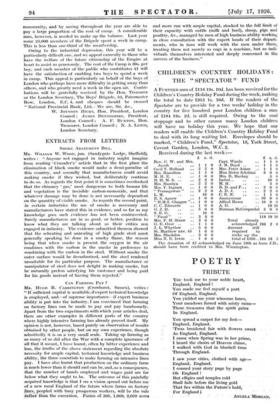EXTRACTS FROM LETTERS SMOKE ABATEMENT BILL.
MR. WILLIAM W. Woon, jun. (Sandygate Lodge, Sheffield), writes : "Anyone not engaged in industry might imagine from reading • Crusader's' article that in the first place the elimination of black smoke would make a demi-paradise of this country, and secondly that manufacturers could avoid making smoke if they wished, but deliberately continue to do so. As regards the first point it is sometimes overlooked that the chimney gas,' most dangerous to both human life and vegetation is the invisible carbon-monoxide, and that whatever damage may be done is not necessarily dependent on the quantity of risible smoke. As regards the second point, in certain industries the use of smoke is necessary and manufacturers have stated this in evidence, and so far as my knowledge goes such evidence has not been contraverted. Surely manufacturers are in as good, or better, position to know what they are talking about as their critics not engaged in industry. The evidence submitted thereon showed that the reheating and annealing of high grade steel must generally speaking be done in a smoky flame, the reason being that when smoke is present the oxygen in the air Combines with the carbon in the smoke in preference to combining with the carbon in the steel. Without smoke the outer surface would be decarburized, and the steel rendered unsuitable for its particular purpose. The manufacturer or manipulator of steel does not delight in making smoke, but he naturally prefers satisfying his customer and being paid for his goods instead of having them rejected."
CAN FARMING PAY?
MR. HUGH B. CARRINGTON (Crowhurst, Sussex), writes : " If sufficient capital is available, if expert technical knowledge is employed, and—of supreme importance—if expert business ability is put into the industry, I am convinced that farming on factory lines can be made to pay and pay handsomely. Apart from the two experiments with which your articles deal, there are other examples in different parts of the country where highly intensive farming has already proved itself. My opinion is not, however, based purely on observation of results obtained by other people, but on my own experience, though admittedly it is on a.very small scale. Taking up farming as so many of us did after the War with a complete ignorance of all that it meant, I have learnt, often by bitter experience and loss, the truths of the above statement regarding the absolute necessity for ample capital, technical knowledge and business ability, the three essentials to make farming on intensive lines pay. I have also learnt that production on the ordinary farm is much lower than it should and can be, and, as a consequence, that the number of hands employed and wages paid are far below what they ought to be. The outcome of this painfully acquired knowledge is that I see a vision spread out before me of a new rural England of the future where farms on factory lines peopled with busy prosperous workers, will be the rule raihel than the exception, . Farms of. 500; 1,000, 2,000 acres
and more run with ample capital, stocked to the full limit of their capacity with cattle (milk and beef), sheep, pigs and poultry, &c., managed by men of high business ability working in close consultation with the expert heads of their depart- ments, who in turn will work with the men under them, treating them not merely as cogs in a machine, but as indi- viduals themselves interested and deeply concerned in the success of the business."










































 Previous page
Previous page